Celebrating our graduates
» Go to news mainClass of 2025 earns MD May 30
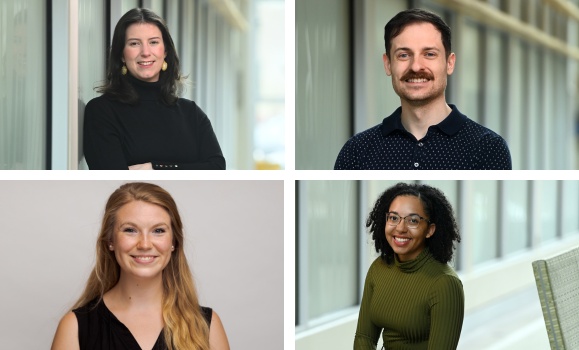
The journey to this moment has been one of dedication, resilience, and discovery. Convocation is more than a celebration—it’s a turning point, marking both the culmination of years of hard work and the exciting possibilities that lie ahead.
For the Class of 2025, this day signifies the transition from medical students to doctors. Equipped with the knowledge, skills, and compassion honed throughout their training, they now step into the world of patient care—first in residency and then as leaders in their fields.
On May 30, we gathered to honour their achievements and bright futures. Each graduate’s story is one of perseverance and purpose, a testament to their passion for medicine and commitment to making a difference.
Here are just a few of the grads making us proud.
Resilience and representation: Dr. Jordin Fletcher champions change
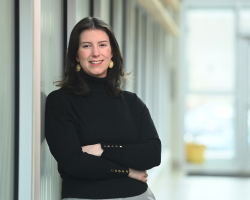 Born in Kjipuktuk in Mi'kma'ki, Dr. Jordin Fletcher's journey is a testament to strength, resilience, and the power of representation.
Born in Kjipuktuk in Mi'kma'ki, Dr. Jordin Fletcher's journey is a testament to strength, resilience, and the power of representation.
Raised in Dartmouth and Porters Lake, she carries the rich heritage of Missanabie Cree First Nation, where her grandmother is a residential school survivor, and Millbrook First Nation, alongside the influence of her white settler grandparents. By the time she entered high school, she knew she wanted to pursue a career in medicine, an idea nurtured by her mother’s support and encouragement.
Dr. Fletcher completed an undergraduate degree in nursing at Dalhousie and worked as a registered nurse for five years before applying and being accepted into medical school. She recognized the racism, harm, and overall structural violence that Indigenous people regularly face in healthcare. When she began her medical studies, she hadn’t encountered another Indigenous physician. This changed in 2021 when she met Dr. Brent Young, who is Anishinaabe and a member of Sandy Bay First Nation, as well as academic director of Indigenous Health at Dalhousie, and clinical lead at the Wije’winen and Sipekne’katik Health Centres.
“I hadn't been absent from these structures working as a nurse,” she says. “So, meeting Dr. Young and knowing that we exist and that there's at least some safe space to work in was reassuring.”
Creating safe spaces
As she embarked on her medical school journey, Dr. Fletcher quickly realized that a safe space for community building was limited. In response, she and two of her peers founded the Indigenous Medical Student Association (IMSA).
“We became aware that surviving medical school as Indigenous students requires strong community, and we wanted to create the IMSA so students could access resources to support building community and each other,” she says. “We also knew it is important to have a collective Indigenous medicals student voice.”
Under her direction and after numerous conversations with leadership, the Indigenous medical student lounge was created as a space for belonging. It became a symbol of support and celebration, reflecting Dr. Fletcher's commitment to her community.
Recognizing the dehumanizing foundations of medical education with respect to Indigenous peoples, Dr. Fletcher also pushed for culturally informed curricula and resources. Her efforts resulted in a permanent Indigenous medical student representative on the undergraduate medical education curriculum committee and contributed to culturally appropriate representation in medical cases in the undergraduate program.
In April of this year, she was recognized with the Association of Faculties of Medicine of Canada (AFMC) Indigenous Health Advocacy Learner Award. The award is a celebration of her outstanding dedication to dismantle anti-Indigenous racism and advance cultural safety, health equity, and the wellness of First Nations, Métis, and Inuit peoples through advocacy, education, and research. Though honoured to be recognized at a national level, Dr. Fletcher says receiving the award is bittersweet.
“I think the real question is: what do awards like this mean to residency programs—especially those where Indigenous physicians aren’t even getting through the doors? They can offer validation in a colonial language, but what matters most to me is the impact on community and my people.”
Breaking barriers and building community
In 2024, Dr. Fletcher completed a family medicine elective at the Wije’winen Health Centre and Sipekne’katik Health Centre with Dr. Young, and then resident, Dr. Shanté Blackmore from Millbrook First Nation. It was the first time an Indigenous medical student, resident, and staff physician had practiced together. The experience, a medical school highlight for Dr. Fletcher, had a significant influence on her future residency.
“I always wanted to work in community, and seeing the scope of what can be provided from a family physician perspective, I started to realize it was something that could work for me,” she recalls. “I was unlikely to consider family medicine without this rotation.”
Dr. Fletcher will begin her family medicine residency here at Dalhousie, alongside Dr. Young at the Sipekne’katik Health Centre in July, and she is looking forward to providing the same leadership and visibility for future medical students that she experienced.
She recognizes the importance of having Indigenous clinicians working with and in community, in research, and in medical education—this is what reconciliation looks like. She is deeply committed to fulfilling this vision.
“It's a really special space to be welcomed into, and you have to treat it as an honour,” she says. “There's a lot to learn and a lot of listening.”
Guided by the values and priorities of the communities she serves, Dr. Fletcher’s future practice will embrace land-based approaches and relational ways of knowing. With humility and purpose, she is building a path where care is not only delivered, but truly shared.
Advocacy in focus: How Dr. Tyler Herod is transforming healthcare for patients with sight loss
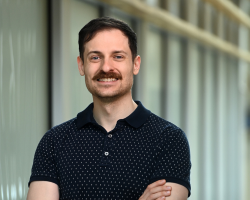 A hospital should be a place of healing, but for patients with sight loss, it can be a maze of invisible barriers.
A hospital should be a place of healing, but for patients with sight loss, it can be a maze of invisible barriers.
Staff enter the room without announcing themselves. Meal trays are placed silently in front of patients who can’t see them. A name is called in a waiting room, but the patient has no idea where to go.
These small moments add up to an overwhelming experience—one that new grad Dr. Tyler Herod set out to change as a medical student.
Now, as he prepares to begin his residency in ophthalmology, he’s determined to make healthcare more accessible.
Bridging problem-solving and patient care
Medicine was not always on Dr. Herod’s radar.
With an aptitude for math, physics, and problem-solving, he initially completed mechanical engineering at Dalhousie. Through a co-op program, he did two work terms in biomedical engineering research, where he realized his true passion was working on problems aimed at improving the lives of others, inspiring him to pursue a Master of Applied Science in biomedical engineering.
“It was during my master’s that I concluded that becoming a physician, not an engineer, would be the most direct path to fulfilling my desire of wanting to improve the lives of others with my career,’ says. Dr. Herod.
He entered medical school in 2020 as part of the Class of 2024, eager to explore all the specialties that Dalhousie had to offer. But just as his journey was beginning, his world shifted—his father suffered a massive stroke at home in Alberta.
Separated by provinces and strict pandemic travel restrictions, Dr. Herod tried to balance his studies with supporting his family from afar. As the months passed, the strain took its toll. Eventually, he made the difficult decision to step away from medical school to focus on his own well-being.
“While a discouraging event to navigate at the start of my journey, I knew that a “reset” would be just what I needed to give medical school my best effort,” recalls Dr. Herod. “The fact that I was successful in matching into ophthalmology is, I believe, a testament to how taking time off from studies can truly lead to positive outcomes.”
That time away, though challenging, gave him clarity about the kind of physician he wanted to become. When he returned, he brought with him not only a renewed focus on medicine but also a deepened commitment to advocacy—recognizing that healing extends beyond the operating room and into the systems that shape patient care.
Upon his return he quickly learned he was interested in surgery, with its complex problem-solving, attention to detail, and collaborative teamwork resonating with what he loved about engineering. He participated in the Surgical Exploration and Discovery (SEAD) Program after his first year, providing an avenue for him to explore various surgical specialties early in his training. This experience guided his choice of clinical electives in second year, leading him to urology and ophthalmology—the latter being the only surgical field not included in SEAD.
“I remember when I discovered ophthalmology, I was fascinated with how it merges surgery, with the applications of technology and physics that I had enjoyed learning about in engineering,” he says. “What truly hooked me, however, was recognizing how ophthalmologists restore and preserve a patient’s ability to connect with others and the world around them through their vision. This represents a sense of purpose I have always aspired to have in my career.”
As he deepened his interest in ophthalmology, Dr. Herod also became interested in patient advocacy. Eager to begin making a difference, he joined the Community-Engaged Service-Learning (CESL) Program and was connected with the Canadian Institute for the Blind (CNIB), where he took on a project aimed at identifying and addressing accessibility challenges in hospitals for patients with sight loss.
During focus groups with individuals living with visual impairments, he listened to their experiences navigating healthcare—often filled with frustration, fear, and avoidable obstacles. It became clear that many of the barriers they faced were not due to a lack of resources but rather a lack of awareness.
“We heard numerous examples of how healthcare workers often fail to recognize a person’s disability in the hospital, under the assumption that they can be seen,” says Dr. Herod. “These focus groups sparked my passion for wanting to contribute towards making hospitals less daunting for those that live with sight loss.”
Determined to bridge this gap, he and his collaborators, including two people with lived experience, developed training sessions for healthcare workers, equipping them with practical strategies for providing more inclusive care. Over time, these sessions grew into hospital-wide education initiatives reaching over 450 individuals, including presentations at Grand Rounds and direct collaborations with hospital leadership to implement systemic changes.
Expanding impact
Dr. Herod’s initiatives are already creating meaningful change locally, and through additional research projects rooted in sight loss advocacy, he hopes to expand his impact.
“These projects will allow us to share our findings at conferences and publish our initiatives to academic journals, both of which are crucial steps for helping influence changes in healthcare policies beyond Nova Scotia.”
This summer, Dr. Herod will head to Saskatoon where he will begin his ophthalmology residency at the University of Saskatchewan and seek new opportunities to expand accessibility initiatives. Those that he created in Nova Scotia will continue to move forward through the collaborations he established with the CNIB, Vision Loss Rehabilitation (VLR) Canada, and Nova Scotia Health. As he steps into this next chapter, he remains committed to integrating advocacy into his medical career.
“As I transition into my career as a future ophthalmologist, I intend to continue to advocate for making healthcare more accessible for those living with sight loss, as my experience as a medical student has shown me that there are still significant improvements required in achieving this important goal.”
In March 2025 Dr. Herod was honoured with a Dalhousie’s 2025 Board of Governors’ Award, recognizing his unwavering commitment to empathy, mentorship, and advocacy.
The community connection: Dr. Katherine Houser's journey to medicine
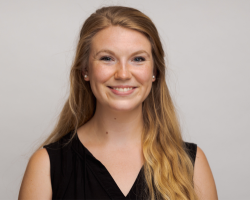 For as long as Dr. Katherine Houser can recall, she knew she wanted to work in healthcare.
For as long as Dr. Katherine Houser can recall, she knew she wanted to work in healthcare.
Growing up in Moncton, New Brunswick she heard stories of her mother’s compassion and dedication to nursing and was captivated by the idea of making a difference, dreaming of the day she could follow in her mother’s footsteps.
When she faced an unsuccessful application to medical school, she pursued a Master of Applied Health Services Research. She was hired as a community developer with Horizon Health Network, a job that married her passion for health promotion and a person-centered approach to care, with her love for human connection. In this position, she collaborated with local community members and organizations to improve health outcomes and enhance the community's wellbeing through engagement and empowerment.
“I remember reflecting on how fulfilling this work was and questioned whether medicine was still in the cards for me,” she recalls. “I could see myself thriving in the world of population health work.”
Over time, she gained a deeper understanding of the systemic obstacles to change and recognized the significant impact that a physician's voice can have in health advocacy and systems reform. That realization was the spark that brought her back to her dream of becoming a doctor.
Now, as she embarks on her residency in family medicine in her hometown of Moncton—the very community she hopes to serve long-term—Dr. Houser is poised to make that dream a reality.
The power of connection
What draws her to family medicine is the same spirit that guided her in community development: a love for human connection.
“I love getting to know people and making them feel heard and safe,” she says. “I want to be that trusted person my patients can go to with any and every question or concern.”
Family medicine also reflects her strong commitment to health promotion and disease prevention, as well as her drive to empower patients and families to make informed choices about their health and wellbeing. She’s drawn to the wide range of patient concerns and the complexity of care, which keeps each day dynamic and fulfilling. She values being a connector—helping patients navigate the system, access resources, and feel truly heard and supported, particularly those from equity-deserving communities.
“I like being in a position to support a patient with any concern they have when they walk through the door,” she says. “If I’m not able to help them with their presenting concern, I will do my best to connect them with the appropriate resources.”
Leadership and service
This will not be the first time she will be in a position of support and connection. During her time at Dalhousie Medicine New Brunswick (DMNB), Dr. Houser distinguished herself through leadership and service. She supported peers as the Community-Engaged Service Learning NB rep, and as a convocation representative, she helped celebrate their collective accomplishments.
She developed a fourth-year Leadership in Medicine elective to enhance her skills and strengthen her commitment to advocacy and the study of health systems. Working with the New Brunswick Medical Society, she gained insight into healthcare policy and system reform, particularly the issues caused by poor communication among stakeholders, something she hopes to tackle with her research on interprofessional collaboration.
During medical school, Dr. Houser was also part of the Student Diversity and Inclusion Committee, hoping to contribute meaningfully to conversations around equity and representation. Engaging with peers, staff, and faculty who brought lived experiences and insights into systemic injustice, she began to see how institutional structures—often invisible to those they benefit—can create significant barriers for others.
“It really deepened that recognition of the privilege that comes with being a physician. It’s so important to use that influence to point fingers at systemic barriers that perpetuate health inequities and seek solutions for how the system can better meet the needs of others, rather than expecting others to adapt to a flawed, inequitable system.”
Leading from within
As Dr. Houser looks toward her future career, she remains steadfast to the kind of physician she wants to be and the impact she hopes to have, remarking with enthusiasm, that she plans to help address the current state of the primary care system in New Brunswick, which faces an aging and growing population, long wait times, poor access, staff shortages, and an outdated care model.
She plans to work in a community family medicine practice, leaning into her strengths and interests to address the priorities in the community she serves. She envisions a clinic that prioritizes culturally safe care, offers gender-affirming services, and supports patients navigating complex social circumstances.
“My ability to form trusted connections and support a patient-centred experience aligns with my vision to make my patients feel seen, heard, safe, valued and supported to be their authentic selves,” she says. “I think this is especially important when caring for equity deserving groups, like women and the 2SLGBTQIA+ community.”
She wants to build systems that don’t just respond to inequities but actively dismantle them. Family medicine gives her the breadth to pursue that vision: to care for diverse communities, to lead from within, and to keep learning from the people she serves.
Mentorship in medicine: Dr. Ariel Provo’s mission to uplift and inspire
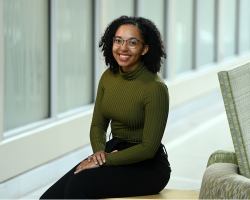 “There’s no way I’ll be able to do this.”
“There’s no way I’ll be able to do this.”
It’s a sentiment Dr. Ariel Provo sometimes hears at the start of a STEM (science, technology, engineering, and mathematics) student tutoring session. But by the end, students are usually surprised at how far they’ve come, expressing: “That wasn’t as bad as I thought.”
It’s a moment that happens frequently—and one that reminds the new grad why she shows up, week after week.
From the basketball court and classroom
Raised in Lake Echo, Nova Scotia, Dr. Provo has deep ties to the African Nova Scotian communities of East Preston, North Preston, and Halifax, which helped shape her strong sense of belonging. Her early interest in medicine was sparked by a cousin she deeply admired, whose own dreams of becoming a doctor were shaped — and ultimately limited — by significant health challenges, and socioeconomic and systemic barriers. Paired with her love of science and math, it wasn’t long before she too began imagining herself in a white coat.
“I remember thinking, why not pursue a career where I get to study and learn the things I love?” recalls Dr. Provo. “From that point on, I set my sights on medicine and worked toward making it happen.”
She enrolled in Dalhousie’s highly competitive medical sciences program—where she balanced a demanding academic schedule with varsity basketball. The program’s broad curriculum gave her a strong foundation for medical school and by the time she entered Dalhousie Medicine, she had already been introduced to many of the core topics.
Still, the transition to medical school came with challenges that tested both her resilience and identity. On the day of registration, Dr. Provo tore her ACL and meniscus—an injury that abruptly halted her active lifestyle and left her feeling disconnected from herself. Compounding that isolation was the ongoing pandemic, which forced portions of pre-clerkship learning online.
“It was a really difficult time,” she says. “I wasn’t moving my body, I was stuck at home, and I felt really cut off from everything that made me feel like me.”
But slowly, she found her way back to herself—discovering new ways to stay engaged and active through yoga, spin classes, Pilates, and even inner-tube water polo.
The power of representation
Throughout her studies, Dr. Provo remained committed to giving back through mentorship, particularly with Imhotep’s Legacy Academy (ILA), a program supporting African Nova Scotian students in Grades 6–12 through STEM education and leadership development. Since 2020, she has served as an after-school and virtual program mentor, French coordinator, and tutor, providing one-on-one support in subjects ranging from biology and psychology to math and French.
“Watching my students grow and succeed has been incredibly rewarding,” she says. “No matter how busy school or life got, I prioritized tutoring because I saw the real impact it had, and I care deeply about my students' success.”
Her tutoring allowed her to see firsthand the shift that happens when Black students feel supported and represented. They begin to believe they belong—a feeling that can be foreign to them when it comes to careers in STEM and medicine, where they continue to face systemic barriers, including limited representation, financial constraints, and implicit bias within academic and professional spaces.
“So many navigate these fields without role models who share their experiences, which can lead to feelings of isolation and self-doubt,” she says. “Representation matters—bringing in Black professionals as guest speakers, hiring diverse faculty, and ensuring Black students see themselves reflected in the curriculum can make a significant difference.”
Looking ahead—and giving back
This summer, Dr. Provo will begin her residency in anesthesiology here at Dalhousie, a specialty that perfectly blends her love of physiology, technical precision, and the dynamic pace of clinical medicine.
“I’m beyond excited and relieved to be staying in Halifax,” she says. “This is home, and I want to build my life and career here.”
Mentorship and outreach remain key priorities for her. She plans to stay actively involved with programs like PLANS and the Black Learners Admission Committee, with a continued focus on supporting and encouraging Black youth to pursue opportunities in STEM and healthcare.
“I believe it’s essential to engage our youth and provide them with the foundation and inspiration to see medicine as a possibility within their reach,” she says. “Hearing African Nova Scotian students say they want to be neurosurgeons, pediatricians, or obstetricians, gives me hope that they will go on to do great things and that Black patients will be well cared for by providers who come from their own communities.”
For Dr. Provo, the path to medicine has been about more than just becoming a doctor. It has been about creating change, opening doors, and making sure others, who follow in her footsteps, feel supported as they walk through them.
Recent News
- New global study Highlights the Biological Roots of Anxiety
- Dalhousie and NCIME launch first‑of‑its‑kind program in Membertou First Nation
- A message from Wanda M. Costen, PhD, Provost and Vice President Academic
- Rhodes scholar Sierra Sparks returns home to study medicine
- President Kim Brooks, Dr. Pat Croskerry appointed to Order of Canada
- Dal’s Highly Cited Researchers reflect on influential global research alliances
- A New Bursary Supporting Black Medical Students at Dalhousie
- Dalhousie’s first physician assistant cohort steps into Nova Scotia’s healthcare system
